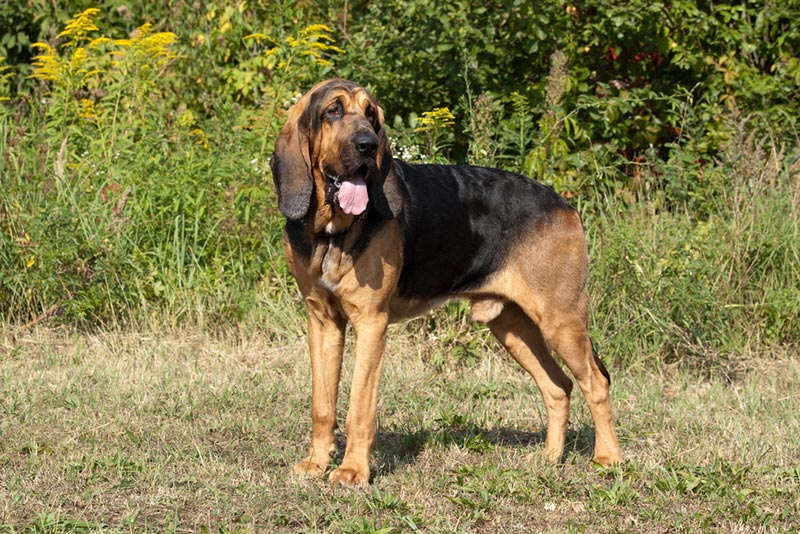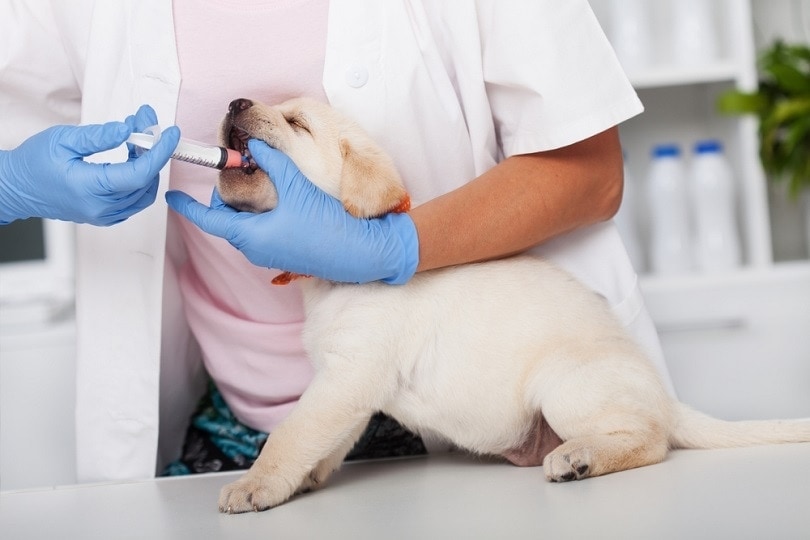How Long Do Bloodhounds Live? Average Lifespan, Data & Care Guide
By Adam Mann
Updated on

Click to Skip Ahead
Whether they’re your prized hunting dog, loving companion, or both, everyone wants to know how long their Bloodhound will live. And while there are a ton of factors that go into how long you can expect them to live, the average Bloodhound usually lives between 10 and 12 years.
But what factors go into this, and how can you get them to live longer? We’ll answer those questions and more for you here.
Bloodhound Average Lifespan
While we’d all like our dogs to live forever, or at least as long as us, the truth is that they have much shorter lifespans. This is also the case with a Bloodhound, with the average Bloodhound living between 10 and 12 years.
However, this is the average lifespan. It’s perfectly normal to have a Bloodhound live a few years longer, and unfortunately, it’s not unheard of for them to pass away a few years before they reach 10 years old. There are a lot of factors that go into this, but 10 to 12 years is the average.

How Long Do Bloodhounds Live in the Wild?
While dogs descended from wild wolves, they don’t have what it takes to live on their own in the wild. This is the case for just about every dog breed out there, and the Bloodhound is no exception. Because of this, there is no set time frame for how long Bloodhounds can live in the wild, and since they don’t possess the necessary skills to fend for themselves, they wouldn’t live long if you released one into the wild.
How to Care for Your Bloodhound for a Long Lifespan
We all want our Bloodhounds to live as long as possible, and luckily, there are a few things we can do while caring for them to extend their lifespan. We’ve highlighted several tips you should follow to help your Bloodhound live as long as possible for you here:
Feeding & Diet
Just like your diet plays a huge role in how long you’ll live, the same is true for your Bloodhound. Not only should you keep them away from table scraps and other foods they simply shouldn’t eat, but it’s just as important to feed them a high-quality diet that meets all their nutritional needs.
While you might be able to save a few bucks by going with a lower-quality diet now, you’re only increasing your long-term medical costs and shortening their lifespan.
Environment
Having a happy, clean, and roomy environment plays a big role in how long your Bloodhound will live. Bloodhounds love spending time outside, and having an environment that lets them get outside, stretch their legs, and use their nose plays a big role in how long they will live.

Care
If you care for your dog, love them, and keep them happy, it can help them live longer. A happy dog is one that’s going to move around more, feel better, and live longer than one that isn’t getting the attention and care they need. Psychological health impacts physical health, and the way you care for your Bloodhound plays a big role in this!
Cleaning
A dog that’s living in a dirty and cluttered home simply isn’t going to live as long or be as healthy as a dog living in a clean home. This isn’t just true for dogs, though, it’s true for you too! Keeping your home clean makes a big difference, so keep the clutter, mess, dirt, and grime off the floor, out of your home, and away from your pup!
Pairing/Breeding
Not only do genetics play a huge role in how long your pup can live, but whether you breed your Bloodhound can play a role too. It’s not that having a few litters will shorten their lifespan; it’s that spaying or neutering your pup can reduce or eliminate the likelihood of them developing various conditions. For example, the earlier you spay a female dog, the less likely they are to develop cancers that can significantly shorten their lifespan.
Healthcare
There’s a reason you go to the doctor for regular checkups or when you’re not feeling the best. It’s the same reason you should take your Bloodhound for regular vet visits and address health concerns while they’re still small. Small issues can turn into big ones without regular vet visits, and something that could be treated early on could end up becoming life-threatening without early detection and treatment.

The Life Stages of a Bloodhound
Most dogs, including the Bloodhound, have three different life stages. These life stages are: puppy, adult, and senior. For a Bloodhound, they become an adult between 18 and 24 months of age, and somewhere between 6 and 8 years old, they become a senior.
There’s no hard and fast rule for when they become an adult or a senior, but typically, their behavior will adjust to what’s normal for their respective life stages at these points.
How to Tell Your Bloodhound Age
While it’s possible to use a blood test to figure out your Bloodhound’s age, most people use different parts of their physical appearance to estimate their age. Many people check a dog’s teeth, as tartar buildup and periodontal disease can be a reliable estimate of their age. But with proper oral hygiene, this isn’t always the most reliable.
Other ways to estimate their age include looking into their eyes, the pads of their feet, and their overall muscle tone to estimate their age. But all of these metrics require knowing what a younger and healthier Bloodhound looks like to compare it to an older one. A vet should be able to help you, but you might not be able to figure it out on your own.

Conclusion
While most Bloodhounds won’t make it to their thirteenth birthday, with proper care, they can. All we can do is everything we can to get them to live as long as possible, but in the end, we have to accept that our beloved dogs simply aren’t going to live as long as we’d like them to.
But now that you know what you can do and what you can expect, you can make informed decisions and do everything you can for your pup.
Featured Image Credit: Glikiri, Shutterstock













